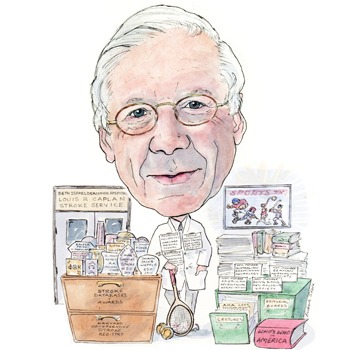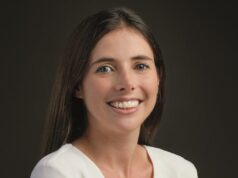
Louis Caplan, senior neurologist at the Beth Israel Deaconess Medical Center, Boston, USA, is a pioneer of the Harvard Stroke Registry and the Stroke Data Bank. He spoke to NeuroNews about his career achievements and why he thinks neuroimaging and thrombolysis are the most significant developments in neurology.
How did you come to choose medicine as a career and, in particular, what drew you to neurology?
I was a history major in college [University]. Medicine offered me a way of being continually intellectual stimulated that was both interesting and challenging. It also provided me with a way of helping people as well as providing me with a method of earning a reasonable living. Neurology has been called the “Queen of Medicine” because of its logic and detail. It also focuses on the most interesting organ—the brain.
Who were your mentors and what wisdom did they impart to you?
Drs Ted Woodward, Eph Lisansky, Derek Denny-Brown, Raymond Adams, and C Miller Fisher were my mentors. They imparted the discipline needed for neurology and the discipline needed for having concern and caring for the patient. They also taught me the importance of extracting as much as possible from every patient encounter.
Which innovations in neurology have shaped your career?
Mostly neuroimaging—the ability to image the brain and its blood vessels quickly and safely has been important in my career.
Also, computer technology that enables recording and analysing registry and other data has been important for my career.
You are a pioneer of The Harvard Stroke Registry and The Stroke Data Bank in the USA. Could you describe how these have had an impact on the field of neurology?
Our memories are good for isolated cases, but they are insufficient for reviewing cases on a larger scale. Therefore, computerised registries have allowed us collect, record and analyse, and search cases using an almost unlimited amount of data items.
Please describe a memorable case where neurology came to the rescue.
A memorable case concerns a very recent patient who developed hand numbness and weakness. The history and examination allowed localisation to the brachial plexus, and studies identified the cause and potential treatments.
What is your proudest achievement in neurology?
Writing a variety of books—some about stroke for physicians; some about stroke for patients and the public; some about how neurology should be practised. Most have been read widely. My writing and editing has resulted in me being widely recognised in almost all countries in Europe, Asia, and North and South America.
What developments in neurology have had an impact on the specialty recently?
The advances in neuroimaging and the advent of thrombolysis for stroke have both had an important impact in recent years.
What recent paper on stroke has caught your attention?
A recent paper describing repeated episodes of arm ischaemia altering the frequency of brain ischaemia in patients with intracranial atherosclerosis.
How would you describe your teaching style?
I use the Socratic method of questioning and dialogue rather than didactic lecturing. I try to teach by example at the bedside.
You are a honorary member of the German, Australian and Hong Kong Neurological Societies and the Korean Stroke Society, how have these experiences abroad added to your career?
I have trained many Asian, European, Canadian and South American stroke fellows. Their inputs and experiences broaden my knowledge. When the fellows have returned to their country, we often engage in research projects together. This broadens the applicability of the results. It also allows us to compare and contrast the frequencies of various lesions in different ethnic groups.
How do you see the neurological field developing in the future?
I can see more involvement in recovery and rehabilitation.
What advice would you give to neurologists just starting out in the field?
They should find subspecialty interests that excite them. This will help them grow and enjoy their work more. Try to derive something from each patient encounter—whether about a condition, particular lesion, or about the individual and how they handle and deal with their problems.
What are your interests outside of medicine?
Tennis, I still play competitively. I also read avidly and take an interest in sport, especially football, baseball, and [ice] hockey.
I enjoy watching and helping my 13 grandchildren to grow and mature and helping my six children and their spouses deal with and enjoy their children.
Fact File
Hospital appointments
1979–1984 Chairman, Department of Neurology, Michael Reese Hospital, Chicago, USA
1985–1996 Neurologist-in-chief, New England Medical Center, Boston, USA
1998–present Senior neurologist, Beth Israel Deaconess Medical Center, Boston, USA
Academic appointments
1985–1996 Professor and chairman, Neurology, Tufts University School of Medicine, Boston, USA
1990–1997 Professor, Medicine, Tufts University School of Medicine, Boston, USA
1985–present Lecturer, Neurology, Boston University School of Medicine, Boston, USA
1999–present Professor, Neurology, Harvard Medical School. Boston, USA
Education:
1958 B.A. Williams College
1962 M.D. University of Maryland School of Medicine-Summa Cum Laude
Postdoctoral Training:
1962-1963 Intern, Medicine , Boston City Hospital
1963-1964 Assistant Resident, Medicine I Medical Service, Boston City Hospital
1966-1969 Resident, Neurology, Harvard Neurological Unit, Boston City Hospital
1969-1970 Cerebrovascular Disease Fellow, Massachusetts Genal Hospital
Board Certification:
1969 American Board of Internal Medicine
1972 American Board of Psychiatry & Neurology
2005 American Board of Psychiatry & Neurology, Vascular Neurology
Membership and committees
1991–present Massachusetts Neurological Society
1991–present Australian Association of Neurologists
1992–present American Society of Neuroimaging
1993–present German Neurological Society (Honorary Member)
1996–present American Medical Writers’ Association
1991–present Hong Kong Neurological Society
1998–present Harvard University, Member, many ad hoc committees for professorial appointments
Awards
2009 Honorary member, American Neurological Association
2009 Houston Merritt Award, American Academy of Neurology
2010 President’s Award for Service to Stroke. World Stroke organization
2012 Johann Jacob Wepfer award of the European Stroke Organization













